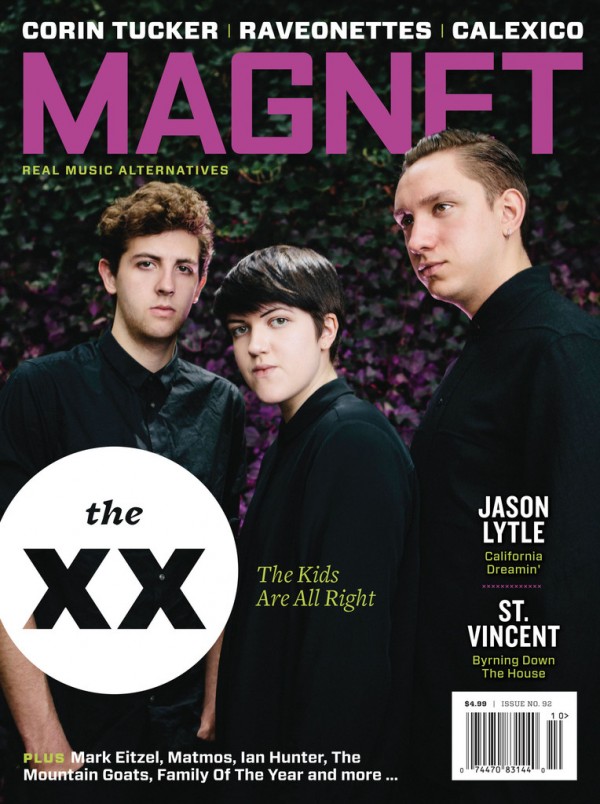MAGNET: Both Romy and Oliver were given to dressing head to toe in black and there was an unspoken agreement that this would become their look. “I hate to think of it as a uniform, you know? But my teenage years was literally like a descent into the dark clothes,” says Oliver. “I don’t know anything different, to be honest. A lot of my family wear all black and I always thought it was quite chic, I suppose.”
“We never had that sort of, ‘by the way, everyone wear black’ moment, I never said ‘Oliver, you can’t wear that brown top’,” says Romy. “I would hate to have that sort of conversation, but you know, I’ve worn black since I was about 15, basically, just it’s all I’ve worn. And I’ve never thought too much about it. I don’t actually own anything that’s not black now.”
Shy about their nascent singing techniques, or lack thereof, Romy and Oliver insisted on singing everything together so that neither would have to take the blame for bum notes. “I found comfort in singing with Romy,” says Oliver. “No one wanted to sing first. It was too much of a thing, you know? This was my oldest friend. It was like a compromise, singing together. And through singing together we gained the confidence to sing alone.” They began writing and recording song segments at home using garageband on their laptops and emailing and IMing the snippets back and forth. “There’s that certain shyness about having to express yourself and it’s quite openly emotional,” says Romy. “What we used to do is we used to just speak to each other on Instant Messenger from our [respective] houses an we’d kind of share music and things like that and then if I came up with something or I wrote these lyrics, I’d send it over to him and he could take it in on his own and react and send it back to me. That’s kind of how we wrote a lot of the first album.” The hushed singing style emerged from necessity. Often writing and recording late at night in their bedrooms, they didn’t want to wake their parents.
You would be forgiven for thinking that when Romy and Oliver duet about the twilit vagaries of post-teen romance they are singing about their relationship but you would be mistaken. Their relationship has never trespassed the borders of the platonic — they are in fact singing past each other. “Our songs were kind of disjointed, and that was something I always kind of liked because I think one thing that is different about us is that we’re not your normal male/female duet, you know?,” says Oliver. “Not in the same vein as like, Ike and Tina. We’re just the best of friends, though we’re singing these love songs it’s kind of, aimed outwards at different people, and it was fine to have that disjointedness.”
Both Romy and Oliver are gay. It’s not something they go around advertising, nor do they shy away from it when the topic comes up. “I was outed in the first interview we ever did by a friend, and um, I was frustrated about that at first, because I didn’t want it to become something that defined us,” says Oliver. “Then I was just happy with it because it was just out there, and it wasn’t a big deal, from the beginning it was out there and if people wanted to know they could do their research. And I’m kind of happy with how it is, you know? It hasn’t become a big thing.”
“It’s not a big deal,” says Romy. “I kind of never shout about it because it’s not something that seems like it changes me in any way, so it’s kind of like, when I’m writing a love song, it kind of doesn’t feel to me like if I was writing about a boy I would be writing it any differently. I really don’t put it out there as the first thing about me. I guess that’s the only sort of message I’d like to get across: It doesn’t have to define you, by being gay or lesbian. It’s just a part of you.” MORE
THE XX PLAY A SOLD OUT SHOW AT THE WCL IN WILMINGTON Tue. APRIL 1st

